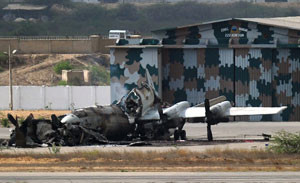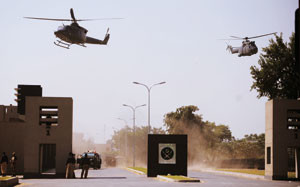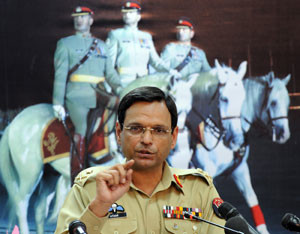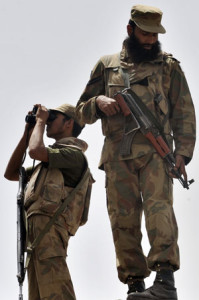Reinventing Pakistan’s Army
By Imtiaz Gul | News & Politics | Published 14 years ago
 Will the May 2 elimination of Osama bin Laden, the May 22 attack on PNS Mehran, and the arrest earlier last month of a serving brigadier, Ali Khan, serve as a watershed in the history of the country’s entire security establishment? Will it mean for Pakistan what the 9/11 attacks meant for the United States?
Will the May 2 elimination of Osama bin Laden, the May 22 attack on PNS Mehran, and the arrest earlier last month of a serving brigadier, Ali Khan, serve as a watershed in the history of the country’s entire security establishment? Will it mean for Pakistan what the 9/11 attacks meant for the United States?
Theoretically speaking, these alarming incidents (combined with the commando attack on the GHQ on October 10, 2009), should lead to greater introspection and a drastic review of our defence doctrine — if there is one. It’s time to head out of the state of denial and recalibrate our policies to take on the challenges in a more pragmatic and dispassionate way, away from the emotional and nationalist notion that relies heavily on religion as a motivating force. Most civilian and military governments have always coopted religio-political forces without realising the fact that these forces simply exploit the authority at the top to proliferate and promote radical views at the bottom, across all segments of society.
Certain events, recent and past, indicate that the national security notion and its reliance on religio-political forces does offer a huge space for religious ideologies to flourish at the highest political levels. Let us look at a couple of examples.
A few days after the Abbottabad raid on May 2 by the US Navy SEALs, in which Al-Qaeda chief Osama bin Laden was killed, a member of the pro-Taliban Jamiat Ulema-i-Islam stunned other members of the National Assembly by asking them to offer prayers for “the departed soul of bin Laden.” In a house of 342 members, only two MNAs joined Maulana Asmatullah Khan in the prayers. Maulana Atta-ur-Rehman, a former minister for tourism, was also among the three bin Laden sympathisers. (Atta-ur-Rehman’s party, the JUI-F, was until a few months ago, part of the coalition government led by President Asif Ali Zardari. He has also been a vocal supporter of the Afghan Taliban in the past.)
Once Asmatullah Khan was done with the prayers, Deputy Speaker Faisal Kareem Kundi admonished him for offering condolence prayers for bin Laden without his permission. The matter died then and there. This is the same parliament where nobody had dared to offer prayers for Salmaan Taseer, the former Punjab governor who was gunned down by his own security guard. Even two imams in Lahore had refused to lead the funeral prayers for Taseer since they believed that he had committed blasphemy.
 But the attempt to condole bin Laden’s death in parliament underscored the sympathy or empathy, however limited, in Pakistan for bin Laden and his ideology. The hundreds of leaflets suspected Hizb ut-Tahrir activists distributed on May 15 in the Rawalpindi cantonment, where the mighty army is headquartered, also reflected that sentiment. The leaflets accused the army of selling out to the United States and urged “honest officers” to rise against the military. To their surprise, many residents of the area found these  provocative pamphlets at their doorsteps, signed and released by Hizb ut-Tahrir (HT) on May 7.
But the attempt to condole bin Laden’s death in parliament underscored the sympathy or empathy, however limited, in Pakistan for bin Laden and his ideology. The hundreds of leaflets suspected Hizb ut-Tahrir activists distributed on May 15 in the Rawalpindi cantonment, where the mighty army is headquartered, also reflected that sentiment. The leaflets accused the army of selling out to the United States and urged “honest officers” to rise against the military. To their surprise, many residents of the area found these  provocative pamphlets at their doorsteps, signed and released by Hizb ut-Tahrir (HT) on May 7.
Hizb ut-Tahrir (Party of Liberation) is a radical political group dedicated to re-establishing an Islamic Caliphate across the Muslim world. Active in Britain, it is banned in many Muslim countries for its calls to overthrow sitting governments. The Pakistan government had slapped a ban on the outfit in 2004, but the Multan bench of the Lahore High Court overruled the proscription orders in 2005, following the plea by Hizb ut-Tahrir that it is non-violent.
But, paradoxically, the HT still figures on the list of 22 banned organisations that the Punjab government had issued in 2008. This also partially explains the lack of coordination and the state of confusion that accompanies governance at the central and provincial levels.
Then on June 21 came another shock to many when the Pakistani military confirmed that a senior officer serving at the Army’s General Headquarters (GHQ) in Rawalpindi had been taken into custody on May 6 for his “contacts with Hizb ut-Tahrir.” Brigadier Ali Khan had been on a routine posting at the GHQ with the Regulation Directorate until his arrest. The brigadier’s father, a retired junior commissioned officer, had served in the Baloch Regiment from where the current Army Chief General Ashfaq Pervez Kayani also started his career. Confirming the detention of Brigadier Khan, Major General Athar Abbas, the head of ISPR, told Newsline that four officers (majors) were also under investigation on similar charges, but dismissed the perception that a large number of  army personnel were, in any way, associated with extremists or banned organisations. “We follow a zero-tolerance policy towards such activities within the military and therefore prompt action was taken on detection,” says Abbas.
 Further, besides the respective command, an elaborate monitoring mechanism has been in place, led by the ISI and the Military Intelligence (MI) to prevent any ideological proliferation other than the cult that rules the garrison, General Abbas maintains. That is why, he insists, the presence of religiously motivated officers is not a big concern at all, adding that the army remains an egalitarian and secular institution. “It does not discriminate in selection, which is based on merit, regardless of the caste or creed, ethnicity or sect an individual belongs to,” says Abbas, pointing to the fact that currently over 30% of the officers are sons of foot-soldiers, including General Kayani himself.
Further, besides the respective command, an elaborate monitoring mechanism has been in place, led by the ISI and the Military Intelligence (MI) to prevent any ideological proliferation other than the cult that rules the garrison, General Abbas maintains. That is why, he insists, the presence of religiously motivated officers is not a big concern at all, adding that the army remains an egalitarian and secular institution. “It does not discriminate in selection, which is based on merit, regardless of the caste or creed, ethnicity or sect an individual belongs to,” says Abbas, pointing to the fact that currently over 30% of the officers are sons of foot-soldiers, including General Kayani himself.
Talat Masud, a prominent analyst, is dismissive of the media-hype created around Brigadier Khan. “Pakistan is a 180-million strong, predominantly Muslim country, with followers of various sects and ideologies, and I would say the army is also probably like a microcosm of the rest of society.” He argues that members of the armed forces cannot function in a vacuum and, as human beings, they draw inspiration from the rest of the society where sects and ideologies abound. But Masud also advises the army high command to approach this issue carefully, instead of taking refuge in denial or by making hasty decisions.
An intelligence official, with considerable expertise on Afghanistan, also cautions against taking hasty decisions regarding people like Brigadier Khan. “The purges that socialists, led by Noor Mohammad Tarakai and Babrak Karmal, had undertaken led to more backlash within the Afghan forces, and this is what we must avoid,” says the official.
However, analysts also underscore the need for vigilance and preventive measures to stem such a mindset. “While Hizb ut-Tahrir did not pose a threat to the operational capability of the army, its ideas need to be combatted by making an example out of the Brigadier,” says analyst Mosharraf Zaidi.
In the mid 1990s, a group of officers led by a major general, Zaheerul Islam Abbasi and Brigadier Mustansar Billa had been busted as they were planning to stage a coup against then prime minister Benazir Bhutto. Several years ago, Captain Farooq, one of General Pervez Musharraf’s security officers, had been detected as being a member of the proscribed Hizb ut-Tahrir connection. The MI had discovered Farooq’s Hizb ut-Tahrir connection almost nine months after his posting as the security officer to the president. Once spotted, he was briefly arrested and then retired from the Pakistan Army.
Coincidentally, on May 4, 2009, a serving colonel, Nadeem Ahmed Shah, lost his post after the MI figured out he had links with an outlawed outfit. Bashir was then the commanding officer at the Shamsi Air Base in Balochistan, a facility that had practically been handed over to the US-NATO forces for operations inside Afghanistan and the Pakistani border regions soon after the war on terrorism unfolded on October 7, 2001.
In January 2005, a military court sentenced three air force officers to terms ranging from two to nine years for their alleged links with the Jaish-e-Mohammad, led by Maulana Masood Azhar.
Three months later, a trial court handed down the death sentence [in absentia] to accused Naik Arshad Mahmood of the Special Services Group (SSG) of the army in the conspiracy to assassinate Pervez Musharraf. His accomplices, Havaldar Mohammad Younis of the 98 Air Defence Regiment of the Army was awarded 10 years with hard labour, while Lance Naik Zafar Iqbal Dogar of the SSG, who abandoned the mission halfway, became a key state witness.
In September that year, another military court sentenced Major Adil Qudoos, Colonel Abdul Ghaffar and Colonel Khalid Abbasi to different terms on charges of indulging in activities that conflicted with their duties.
 In one instance, a soldier named Abdul Islam Siddiqui was executed in August  2005 following a closed-door Field General Court Martial for complicity in an attack on General Musharraf. The 35-year-old Siddiqui, the court established, pressed the button of the remote control device which caused an explosion targeting General Musharraf in Rawalpindi on December 14, 2003.
In one instance, a soldier named Abdul Islam Siddiqui was executed in August  2005 following a closed-door Field General Court Martial for complicity in an attack on General Musharraf. The 35-year-old Siddiqui, the court established, pressed the button of the remote control device which caused an explosion targeting General Musharraf in Rawalpindi on December 14, 2003.
While the authorities could sniff these dissenting people out, it could not prevent the attacks on the GHQ in October 2009, or on the Naval Base — which were all the work of insiders. Mohammad Aqeel alias Dr Usman, who had served as a nursing assistant in the Army Medical Corps, Rawalpindi, had led the GHQ  attack.
Senior army officials use this episode, as well as that of Brigadier Khan, to underscore the effective monitoring mechanisms within the armed forces and maintain that the multi-layered mechanism makes it almost impossible for a few officers to take over. “How can you rule out the possibility of the presence of ideologically-driven people in the army? After all, it is an army drawn from within society,” says General Abbas. “Everyone is free to practice his faith so long as it does not pose a threat to the institutional cult.”
The military’s policy of glasnost around Brigadier Khan’s detention is a welcome step but the armed forces have a long way to go to cleanse their ranks of the ideological bent of mind. The “creeping coup of religious conservatism” that had begun with General Zia-ul-Haq has not only infected the army but also large sections of society.
Rather than ducking the issue by going into a mode of denial or complacency, the armed forces must move swiftly but cautiously to stem the slide into religiosity. Many serving generals still insist that using “Islam as a motivating force” is crucial for the rank and file of the army but they miss a point: the motivation has gone on to become synonymous with the defence of Islam, rather than the defence of the geographical/territorial integrity of this country — the latter being their primary responsibility. They must know that the Americans, Germans, French and the Canadians don’t motivate their soldiers by using Christianity, or any other religion. The Indians do not invoke Hinduism to motivate their forces against Pakistanis or the Chinese. Let us be clear on one point: the moment you induct religion into statecraft, the lines between state and non-state armies largely vanish.
This article was originally published under the headline “Reinventing the Army” in the July 2011 issue of Newsline.


